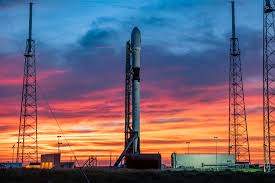SpaceX will launch the Turksat 5A satellite for Turkey tonight. Here's how to watch live

CAPE CANAVERAL, Fla. — SpaceX is set to launch a Turkish communications satellite into orbit on Thursday evening (Jan. 7), and you can watch the action online.
A Falcon 9 rocket carrying the Turksat 5A satellite is scheduled to lift off from Space Launch Complex 40 at Cape Canaveral Space Force Station here in Florida during a planned four-hour window that opens at 8:28 p.m. EST (0128 GMT on Jan. 8).
You can watch the launch live here and on the Space.com homepage, courtesy of SpaceX, beginning about 15 minutes before liftoff. You'll also be able to watch the launch directly from SpaceX here.
Turksat 5A is one of two satellites that SpaceX is contracted to launch on behalf of Turkey. The country aims to increase its presence in space and will help provide communications capabilities to customers across Turkey, the Middle East, Europe, and portions of Africa. It's counterpart, Turksat 5B will launch later this year. In October, activists upset over Turkey's role in a conflict between Armenia and Azerbaijan protested SpaceX's Turksat 5A launch at the company's headquarters in Hawthorne, California in an unsuccessful bid to stop the launch.
This mission will mark the 1st launch of 2021 for SpaceX and its workhorse Falcon 9 rocket. The duo celebrated a banner year in 2020, as a record 26 Falcon 9 rockets blasted off during the year, including two astronaut missions to the International Space Station — marking the return of human spaceflight to U.S. soil.
Tonight’s launch will kick off what is expected to be another busy year here at the Cape. In total, 31 rockets launched from Florida in 2020, and this year could surpass that as more than 40 are estimated between SpaceX and United Launch Alliance mission manifests.
SpaceX itself hopes to launch around 40 missions from its two launch facilities in California and Florida, including two additional astronaut missions as well as a Falcon Heavy. The company has also kicked off more Starship testing this year, including a static fire test of its next prototype, SN9. That craft could take to the skies for a test flight as early as Saturday (Jan. 9).
Riding to orbit atop the Falcon 9 today is the Turksat 5A satellite, a communications satellite built by Airbus for Turksat, Turkey’s sole satellite operator. The 7,700-lb. (3,500 kg) satellite is expected to operate for 15 years, beaming coverage below. Forecasters at the 45th Weather Squadron predict a 70% chance of favorable launch weather conditions Thursday night. The main concerns are the formation of cumulus clouds and thick clouds.
Following a successful liftoff, the rocket’s first stage will return to Earth, landing on a floating platform at sea. To date, SpaceX has successfully recovered 70 first-stage boosters, 21 of which touched down on land and 49 on one of the company's two massive drone ships — "Of Course I Still Love You" and "Just Read the Instructions."
The star of today's mission will be one of SpaceX's newest frequent flyers — a first stage known as B1060. This will mark the booster's third launch and landing attempt. Previously it ferried an upgraded GPS III satellite into orbit and a batch of SpaceX’s starlink satellites.
Thursday's flight will mark the 104th overall launch of a Falcon 9 rocket and the 71st first stage recovery. SpaceX's drone ship Just Read the Instructions is stationed out in the Atlantic, waiting for its chance to snag the returning booster. That touchdown will occur approximately nine minutes after liftoff.
The company's other drone ship, is sidelined in Port Canaveral as it undergoes some necessary repairs and renovations. The massive ship caught 13 rockets in 2020 (40 overall) and needed some TLC before it returned to service.
Both fairing catchers, GO Ms. Tree and GO Ms. Chief, are back in service for this mission. It's unclear yet if the vessel will attempt to catch the Falcon 9's falling payload fairing — the protective "nose cone" that surrounds a satellite during launch — or if SpaceX will just scoop the two halves out of the ocean. (Whether or not a catch is attempted depends on a number of factors, including weather and sea conditions at the recovery zone.) That call will be made approximately 45 minutes after launch.
SpaceX has been successful in its attempts to reuse more of the Falcon 9, even reusing several fairings on multiple missions. The payload fairing accounts for approximately 10% of the cost of the rocket, which is roughly $62 million. Reusing fairings could save as much as $6 million per flight, according to SpaceX.
SpaceX's current iteration of the Falcon 9, called the Block 5, debuted in 2018 and features upgrades that increase its reusability. Company president and CEO, Elon Musk, has said many times that this version of Falcon 9 can fly as many as 10 times with few refurbishments in between flights and as many as 100 times before retirement. Musk also said that he wants his rockets to help facilitate access to space, and Turkey is just the latest country to take advantage of that opportunity. A little over two years ago, Bangladesh sent its first ever communications satellite into space atop a SpaceX rocket, and in July, South Korea launched its first dedicated military satellite from Florida's Space Coast.
Photo: A SpaceX Falcon 9 rocket will launch the new Turksat 5a telecommunications satellite into orbit from Cape Canaveral, Florida on Jan. 7, 2021.(Image: © SpaceX)
Link: SpaceX will launch the Turksat 5A satellite for Turkey tonight. Here's how to watch live. | Space











